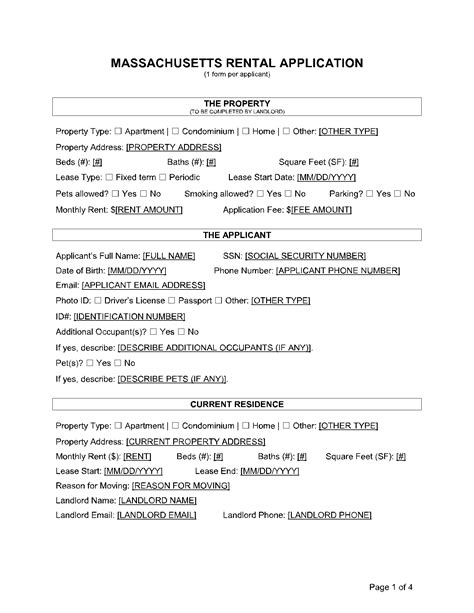Filling out a rental application in Massachusetts can be a daunting task, especially for first-time renters. With so many requirements and regulations to navigate, it's easy to feel overwhelmed. However, with the right guidance, you can increase your chances of getting approved for your dream rental property. In this article, we'll provide you with 7 valuable tips for filling out a rental application in Massachusetts.
Massachusetts has a highly competitive rental market, and landlords often receive multiple applications for a single property. To stand out from the crowd, you need to ensure that your application is complete, accurate, and showcases your best qualities as a tenant. Here are some tips to help you get started:
Tip 1: Understand the Massachusetts Rental Laws
Before filling out a rental application, it's essential to understand the laws that govern renting in Massachusetts. The state has specific regulations regarding security deposits, rent increases, and eviction procedures. Familiarize yourself with the Massachusetts General Laws, Chapter 186, which outlines the rights and responsibilities of landlords and tenants.

Tip 2: Gather Required Documents
To fill out a rental application, you'll need to provide various documents, including:
- Identification (driver's license, passport, or state ID)
- Proof of income (pay stubs, W-2 forms, or tax returns)
- Rental history (references from previous landlords or property managers)
- Credit report (some landlords may require a credit check)
Make sure you have all the necessary documents ready before starting the application process.

Tip 3: Be Honest and Transparent
When filling out a rental application, honesty is the best policy. Be transparent about your rental history, credit score, and any past issues with landlords. Lying or withholding information can lead to your application being rejected or, worse, eviction if you're approved and the landlord discovers the truth later.
Tip 4: Check Your Credit Score
Your credit score plays a significant role in the rental application process. A good credit score can improve your chances of getting approved, while a poor score may lead to rejection or higher security deposits. Check your credit score before applying and work on improving it if necessary.

Tip 5: Read the Lease Carefully
Before signing a lease, read it carefully and ask questions if you're unsure about any terms or conditions. The lease should outline the length of the tenancy, rent, security deposit, and responsibilities of both the landlord and tenant.
Tip 6: Be Prepared for a Security Deposit
In Massachusetts, landlords can charge a security deposit equal to one month's rent. Be prepared to pay the deposit when you sign the lease. Some landlords may also require a pet deposit or additional fees for amenities like parking or utilities.

Tip 7: Follow Up with the Landlord
After submitting your application, follow up with the landlord to ensure they received it and to ask about the status of your application. This shows that you're interested in the property and willing to communicate openly with the landlord.

By following these 7 tips, you can increase your chances of getting approved for your dream rental property in Massachusetts. Remember to stay organized, be honest, and communicate openly with the landlord throughout the application process.
Gallery of Rental Application Tips:






FAQ Section:
What is the average rent in Massachusetts?
+The average rent in Massachusetts varies depending on the location, with Boston being one of the most expensive cities. According to data from Zillow, the median rent in Massachusetts is around $2,400 per month.
How long does it take to process a rental application in Massachusetts?
+The processing time for a rental application in Massachusetts can vary depending on the landlord and the complexity of the application. On average, it can take anywhere from a few days to a week or more to process an application.
Can I negotiate the rent on a rental property in Massachusetts?
+Yes, it's possible to negotiate the rent on a rental property in Massachusetts. However, it's essential to approach the negotiation in a respectful and professional manner. Be prepared to make a strong case for why you're a good tenant and why you're requesting a rent reduction.
